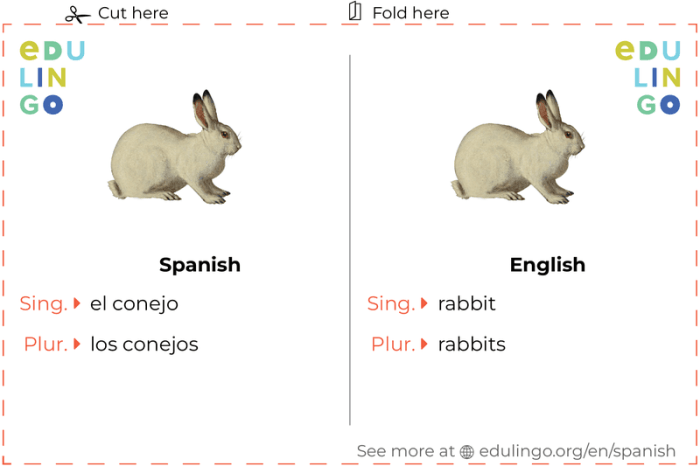Rabbits, with their adorable appearance and playful nature, have captured the hearts of many across the globe. In Spanish-speaking countries, these furry creatures hold a special place in culture and language. Whether you’re a language enthusiast or a traveler seeking to connect with locals, learning how to say “rabbit” in Spanish is a valuable addition to your linguistic repertoire.
In this comprehensive guide, we will explore the intricacies of this term, examining its variations, cultural significance, and pronunciation nuances.
Delving into the Spanish language, we will uncover the direct translation of “rabbit” and delve into the subtle differences in pronunciation across various dialects. We will also shed light on the cultural context surrounding rabbits in Spanish-speaking nations, exploring idioms and expressions that reflect their unique relationship with these animals.
Additionally, we will provide a detailed pronunciation guide, complete with phonetic symbols and audio recordings, to ensure your Spanish pronunciation is spot-on.
Definition and Meaning
The word “rabbit” refers to a small mammal belonging to the family Leporidae. It is characterized by its long ears, short tail, and soft fur. In Spanish, the direct translation of “rabbit” is “conejo”.
Etymology
The Spanish word “conejo” is derived from the Latin word “cuniculus”, which means “rabbit burrow”. This term was first used in the 13th century and has since become the standard word for “rabbit” in Spanish.
Variations and Dialects
The pronunciation of “rabbit” in Spanish can vary depending on the region or dialect spoken. Here are a few examples of how the pronunciation may differ:
Standard Spanish
In standard Spanish, “rabbit” is pronounced as “conejo” (koh-neh-hoh).
Mexican Spanish
In Mexican Spanish, “rabbit” is often pronounced as “conejo” (koh-neh-hoh), but it can also be pronounced as “conejo” (koh-neh-ho).
Argentinian Spanish
In Argentinian Spanish, “rabbit” is pronounced as “conejo” (koh-neh-hoh), but the “j” sound is often pronounced as a “y” sound, resulting in a pronunciation of “conejo” (koh-neh-yoh).
Chilean Spanish
In Chilean Spanish, “rabbit” is pronounced as “conejo” (koh-neh-hoh), but the “j” sound is often pronounced as a “sh” sound, resulting in a pronunciation of “conejo” (koh-neh-shoh).
Formal and Informal Usage
In Spanish, the formal and informal ways of saying “rabbit” vary depending on the context and the level of formality required.
The formal way to say “rabbit” is “conejo” , while the informal way is “coneja” . “Conejo” is typically used in written or formal settings, such as in scientific or academic contexts. “Coneja” is more commonly used in informal or conversational settings, such as when speaking with friends or family.
Examples
- In a scientific paper, you would use “conejo” to refer to the animal.
- In a conversation with a friend, you would use “coneja” to refer to your pet rabbit.
Cultural Context

Rabbits hold a significant cultural presence in Spanish-speaking countries, often associated with good luck, prosperity, and fertility. They are frequently featured in folklore, literature, and art, symbolizing abundance and new beginnings.
Idioms and Expressions
The Spanish language is rich in idioms and expressions involving rabbits. One common phrase is “ser un conejo” (to be a rabbit), which describes a person who is timid or easily frightened. Another expression, “estar como un conejo” (to be like a rabbit), refers to someone who is restless or agitated.
These idioms reflect the cultural perception of rabbits as both gentle and lively creatures.
Examples and Usage
The following table provides examples of sentences using the word “rabbit” in Spanish, along with their English translations and explanations:
Sentences
| Spanish Sentence | English Translation | Explanation |
|---|---|---|
| El conejo es un animal muy rápido. | The rabbit is a very fast animal. | This sentence states that rabbits are known for their speed. |
| Tengo un conejo como mascota. | I have a rabbit as a pet. | This sentence indicates that the speaker owns a rabbit and keeps it as a companion animal. |
| El conejo saltó sobre la cerca. | The rabbit jumped over the fence. | This sentence describes the action of a rabbit leaping over a barrier. |
| El conejo se escondió en su madriguera. | The rabbit hid in its burrow. | This sentence explains that rabbits have a natural instinct to seek shelter in underground burrows. |
| El conejo comió una zanahoria. | The rabbit ate a carrot. | This sentence highlights the common food preference of rabbits, which includes carrots. |
Pronunciation Guide
The Spanish word for “rabbit” is pronounced as “co-neh-ho” in standard Spanish. Here’s a detailed guide to the pronunciation:
Co : Pronounced like the “co” in “cone”. It’s a short, crisp sound.
Neh : Pronounced like the “ne” in “net”. It’s a nasal sound, with the air passing through the nose.
Ho : Pronounced like the “ho” in “hope”. It’s a short, open sound.
Here’s an audio recording of the pronunciation:
Summary
In conclusion, understanding how to say “rabbit” in Spanish is not merely about acquiring a new word but also about immersing oneself in the vibrant tapestry of Spanish-speaking cultures. Whether you’re navigating the bustling streets of Madrid or conversing with locals in the charming villages of Mexico, the ability to communicate about these beloved creatures will enhance your interactions and deepen your appreciation for the Spanish language.
So, embrace the opportunity to expand your linguistic horizons and embark on this journey of linguistic discovery.
FAQ Section
How do you pronounce “rabbit” in Spanish?
The pronunciation of “rabbit” in Spanish is “conejo” (koh-neh-hoh).
Is there a difference between the formal and informal way of saying “rabbit” in Spanish?
Yes, the formal way to say “rabbit” in Spanish is “conejo,” while the informal way is “coneja” (koh-neh-hah).
What are some cultural idioms or expressions related to rabbits in Spanish?
One common idiom is “estar como un conejo” (to be like a rabbit), which means to be very nervous or anxious.